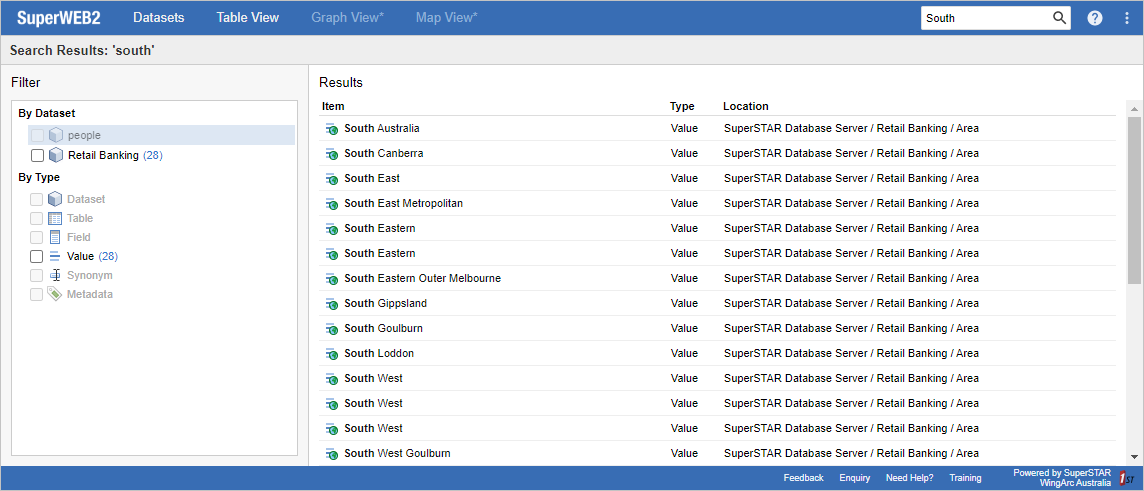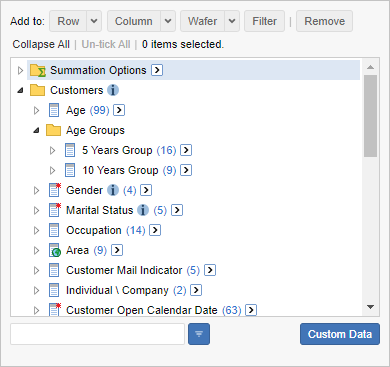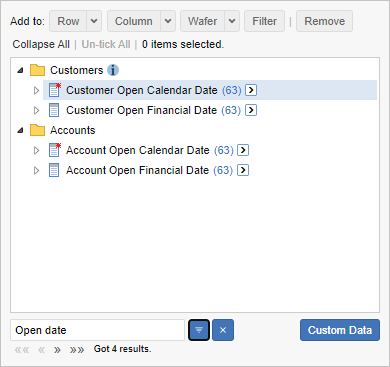Search
You can use SuperWEB2's search and filter functionality to quickly find what you are looking for.
Search Across All Datasets
Use the search box to search across all fields, values, datasets and tables:

By default, SuperWEB2 displays results from all the datasets you have access to, but you can select some of the Filter check boxes if you want to narrow down the results so that they only contain items in specific datasets, or items of certain types.
Notes and Tips for Searching in SuperWEB2
- Searches are not case sensitive. Searching for male or Male will return the same results.
If you search for a single word, SuperWEB2 will return partial matches on that word anywhere in the search result. For example:
Example
Search QueryExample
Matcheseast East
East Gippsland
Eastern
South East
South Eastern
If you search for multiple words, SuperWEB2 will only return matches that include all of the words from the search query.
By default:
The words can appear in any order (they do not have to match the query order or appear together in the result).
SuperWEB2 will not return partial matches for individual words in the phrase.
Both these behaviours can be changed by modifying the search query. To search for an exact match on a phrase in order, enclose the query in double quotes.
To search for partial word matches, use the wildcard characters
*(match multiple characters) and?(match single characters). For example:Example
Search QueryExample
MatchesExamples
That Will Not Matchsouth east
east south
South East Metropolitan
Lower South East
South Lower East
South
East
South Eastern
south east* as above, plus:
South Eastern
south *ern South Eastern
South Western
South East
south eas? South East
South Eastern
lower east
east lower
Lower South East
"lower east" Lower East Side
Lower South East
SuperWEB2 does not support keywords such as AND or OR. As described above, multiple word searches are treated as an AND search by default. If you include the words "and" or "or" in the query then SuperWEB2 will only return results that also include these words. For example:
Example
Search QueryExample
MatchExample
That Will Not Matchsouth and east South and South East South East - If your system has been configured to support datasets in multiple languages, then searching will search the current dataset language only. Make sure you select the same language as the term you are searching for from the menu prior to the search.
Searches are diacritic-sensitive. To search for words containing diacritics/accented characters, you must include the diacritics/accents in the search query. For example:
Example
Search QueryExample
MatchExample
That Will Not Matchcafé Café Cafe cafe Cafe Café You can use a hyphen before a word to exclude it from the search (equivalent to a NOT search). For example if you want to return all results containing one or more particular words but not any results that also contain another specific word. You must use a space before the hyphen in your query, and it cannot be the first word in the search query. For example:
Example
Search QueryExample
MatchesExample
That Will Not Matcheast -south East
Upper East Side
South East inner west -south Sydney - Inner West
Sydney - Inner South West
West Sydney
sydney -west south South Sydney
South Western Sydney
South West Sydney
sydney -west* south South Sydney
South Western Sydney
South West Sydeny
-south east (none; invalid query) If you are searching for a word that contains a hyphen, then you can either include or not include the hyphen in your search query, but you must not use a space before the hyphen. For example:
Example
Search QueryExample
MatchesExample
That Will Not Matchrichmond tweed
richmond-tweedRichmond-Tweed richmond -tweed Richmond
East Richmond
Richmond-Tweed You can use the
~character at the end of a word, followed by either1or2, to do fuzzy matches (matches on similar words) based on Damerau-Levenshtein Distance. The number indicates how close the match needs to be (1returns results that more closely match the search query than2). For example:Example
Search QueryExample
Matchessouth~2 South
Mouth
Month
Youth
If your search includes any of the following special characters, then you must escape them, either by adding a
\character immediately prior to the special character, or by enclosing the entire search query in double quotes:{ } [ ] ^ * : \ /For example, to search for an item named
2021/2022, you need to enter one of the following search strings:2021\/2022"2021/2022"
Filter the Field List
In addition to searching across all the available datasets, you can also search within the currently selected dataset.
Open the dataset you are interested in and select Table View. You can then use the box at the bottom of the tree to filter the list so that it only shows matching fields and field values.
For example:


Notes:
- Filtering is not case sensitive.
- You can use the arrows beneath the filter box to navigate through all the matches.
- Click the X button to remove the filter and revert to the full list of available fields.
